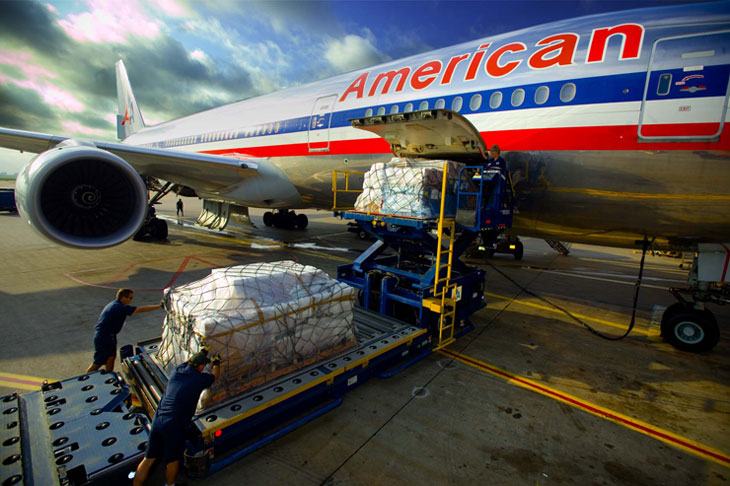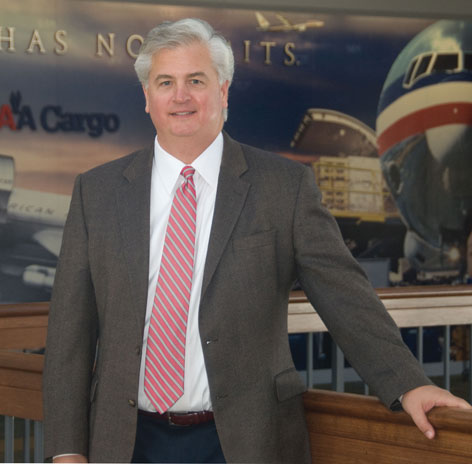

 Steady,
easygoing Dave Brooks is well on his way to holding the job of
president of American Airlines Cargo longer than anyone else in
that carrier’s history—if he is not there already. Steady,
easygoing Dave Brooks is well on his way to holding the job of
president of American Airlines Cargo longer than anyone else in
that carrier’s history—if he is not there already.
The thing about Dave Brooks is that
he appears to us from the times we have seen him, almost unflappable.
Once our family was connecting to
some flights in Charlotte and Dave breezed by with his wife carrying
some kids or maybe some were in tow.
But anyway we were enjoying some
adult beverages in between a delay, and Dave was up against the
same thing.
He paused, said hello, gave us full
attention and then disappeared down some concourse to make his
flight.
The episode would have been forgotten
except for the strong impression that day that in most of whatever
he is doing, Dave seems to handle things well.
Good thing for American Airlines
that this guy is responsible for worldwide American Cargo as the
carrier serves more than 250 cities in the United States, Europe,
Canada, Mexico, The Caribbean, Latin America and Asia, providing
one of the largest cargo networks in the world.
Come to think of it, Dave may be
a senior in longevity amongst any of the big carrier cargo chieftains
anywhere in the world, having been named president of the AA Cargo
division in 1996 after serving as president of the airline services
division of AMR Services Corporation, an aviation services company
formerly owned by AMR Corporation.
Our Mr. Brooks joined American
as a financial analyst in 1983, and held managerial positions
in finance and airport operations before being named president
of the airline services division of AMR Services in January 1994.
Maybe a key to Dave Brooks is that he
is a native of New York where many if not a majority of the truly
great air cargo people in the USA started, dating back to the
days once upon a time when NYC (meaning JFK/LGA and EWR) handled
almost as much freight as the rest of North America combined!
Mr. Brooks graduated from Dickinson College
in 1979 with a Bachelor of Arts degree in Economics. in 1983,
he received a Master's degree in Business Administration from
Cornell University.
Here Dave goes up front and personal about
the cargo business, pulling no punches during the Vancouver World
Cargo Symposium 2010.
ACNFT: How did AA
Cargo finish 2009 and what are indications for business in 2010?
DB: 2009
was the worst year anyone I know has ever seen – and depending
on where you’re standing on the globe, air cargo volumes
dropped between 20-40%. and just to make sure the blood was really
gushing, with that much excess capacity wagging in the wind, yields
collapsed.
I think we did do a good job of
staying the course with our long-term strategies even while having
to make some stinky tactical moves on the pricing side. For example,
we furthered our business process reengineering project that we
call Project Everest, by investing about $20 million in technology
and process improvement. rather than finding more ways to trash
the yield market, we focused on attracting market share.
And just this past month, we opened
two new cargo facilities at important international gateways,
JFK and LAX.
These investments in the business
will payoff over many years, and so are consistent with the common
view that, despite the pain of 2009, air cargo is still expected
to grow in the 5-7% range depending on whom you talk to.
ACNFT: Which markets
offer greatest opportunity and why?
DB: There
are still too many planes chasing too few shipments. Emerging
darling traffic like pharmaceuticals command higher yields—but
also have more challenging itineraries. Carriers thinking they
can make money flying freight from NY to London and back are in
for a rude awakening.
Rapid market recovery is underway
on traffic from Asia to Latin America and Europe to Latin America,
as well as U.S. to the Middle East.
American begins new service between
Beijing, China and Chicago on April 26th. This service augments
our current service from Shanghai, China and Tokyo, Japan. We
also begin new service between Madrid and New York next month.
ACNFT: Does recent
announcement that Japan Airlines stays in Oneworld open up any
avenues of cooperation for air cargo?
DB:
We already cooperate on various levels with Japan Airlines today.
We’ve had a very successful track record with bi-lateral
agreements and we look forward to exploring opportunities with
JAL that further strengthen the relationship and provide value
to customers.
ACNFT: Last year AA
Cargo introduced a perishables product. Has the introduction worked?
How many stations have it? Will any service enhancements be added
in 2010? What have you learned about perishables from bringing
that business aspect of your service offering forward?
DB: AA
has a robust service offering in place for cold-chain shipping
throughout our global network—expedite tc.
We’re very pleased with the
service and are hearing good things from customers.
We’ve obtained accreditation
by the container manufacturer Envirotainer—in 60 cities
in 24 countries worldwide. this means that our service meets the
utmost requirements for quality as defined by pharmaceutical industry
standards.
We’ve done a tremendous amount
of training worldwide and have developed internal tools and processes
to support visibility and product reliability throughout our network.
ACNFT: Most recently
from AA Cargo came an air cargo incentive program offering travel
rewards, club access and other perks to shippers. Is that working?
How does it work? If the program were expanded what would be offered
next?
DB: We’ve
launched a substantially improved rewards program called “business
extrAA,” which allows cargo customers to earn passenger
travel awards when they ship, such as upgrades, free tickets,
admirals club access, and so on. This loyalty program is most
beneficial for our small and mid-sized customers who do not have
larger incentive agreements in place.
ACNFT: How much will
these new programs impact AA Cargo business? Are there any new
programs or services in the pipeline?
DB: We’re
focused on giving customers what they value— so we’re
putting our dollars and our effort behind strengthening our network
to serve our customers with more destinations—customer service
initiatives—streamlining operations and processes—and
delivering on technology which supports reliability and ease of
doing business.
ACNFT: Can you address
the big business of airmail? how important is it to AA Cargo and
what are you doing about it?
DB: Mail
volumes are dropping organically as the world goes digital. The
mail is still a very important part of our business as we seek
to serve the various postal organizations around the world.
Taking the industry view what do
you deem the top priority that air cargo needs to address right
now?
A major upcoming byproduct of the
post 9/11 era is the legislatively mandated August 2010 deadline
to screen all cargo on passenger aircraft. I am frequently asked
my opinion on what will “happen” on 8/1/10 –
will we be ready? Will the supply chain melt down?
My opinion is that we will see sporadic
backups in air cargo acceptance, delays in some locations of a
day or two, but that’s it. The reason is our constituents
have been well aware of this requirement for the better part of
two years and have had in their best interests – as shippers
– to screen their own cargo, or as carriers, to make the
investments to screen unscreened cargo. Also, shippers know that
passenger aircraft provide half of the world’s air cargo
capacity, so the “we’ll just use freighters”
plan isn’t a very attractive strategy for coping with the
new screening requirement.
ACNFT: AA Cargo is
present and active at IATA events such as WCS and CNS. Can you
describe why you support each event?
DB: It’s
important to have face time with customers, competitors and industry
entities. It’s important to listen and speak. These events
provide such an opportunity.
ACNFT: You have been
the top cargo executive—a president at one of the world’s
greatest airlines for some time now. what do you think will be
your legacy to AA Cargo? To date, what are you most proud of accomplishing
that has impacted air cargo beyond AA?
DB: In
this business, safety has to be at the top of the list, so when
they carry me out of here and I have kept our customers and employees
safe that will be very satisfying. Beyond AA, you never have the
time you wish you had to make a contribution to the industry.
So I’ve been selective in the industry organizations in
which I participate, and have tried to be a consistent and credible
collaborator and supporter.
Geoffrey Arend |
|



